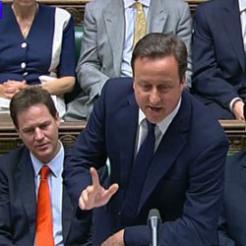Representatives from 18 charities have signed an open letter to the Prime Minister stating that claims he made in Parliament regarding exempting disabled people from the bedroom tax were untrue.
Those signing the letter include the chief executives of Carers UK, Sense, Rethink Mental Illness and Mencap.
The letter states: “As we had warned, the government's discretionary fund of temporary support for disabled people is inadequate and completely inappropriate for those with long-term housing needs.
“Far from being exempt or protected, day after day we are seeing the evidence that disabled people and their families are amongst the hardest-hit by this policy.”
The policy only exempts disabled children who cannot share with siblings, and disabled tenants or their partners who need a room for someone who does not live with them to come in and provide overnight care.
Those not exempt include disabled, seriously or terminally ill people who need round-the-clock care and who cannot share a room with their partners because of disrupted sleep or the need for hospital beds or medical equipment throughout the night.
It also does not include parents of disabled children who need an extra room so that one of them can sleep while the other provides overnight care.
Yet David Cameron told the House of Commons: “Obviously, what we have done is to exempt disabled people who need an extra room.”
The charity representatives reiterate calls to make urgent exemptions to the bill, claiming statements from the Prime Minister are entirely untrue.
The letter followed comments made during Prime Minister’s Questions in the House of Commons last Wednesday. An original letter had previously been written to the Secretary of State for Work and Pensions which set out the impact the ‘spare room’ cuts to Housing Benefit are having on disabled people and their families.
It concludes: “Surely, if disabled people, those with serious and terminal illnesses and carers caring for their loved ones need additional accommodation, they should not be told this space is 'spare' and forced to pay or apply again and again for insufficient, temporary support just to stay in their own homes.”
The 18 charity representatives who signed the letter are:
- Heléna Herklots, chief executive, Carers UK
- Liz Sayce, chief executive, Disability Rights UK
- Jan Tregelles, chief executive, Royal Mencap Society
- Lesley-Anne Alexander, chief executive, Royal National Institute of Blind People
- Deborah Jack, chief executive, National Aids Trust)
- Paul Jenkins, chief executive, Rethink Mental Illness
- Alison Garnham, chief executive, Child Poverty Action Group
- Sally Light, chief executive, Motor Neurone Disease Association
- Gillian Morbey, chief executive, Sense
- Richard Leaman, chief executive, Guide Dogs
- Paul Soames, chief executive, Contact a Family
- Jane Harris, managing director, campaigns and engagement, Leonard Cheshire Disability
- Sonya Chowdhury, chief executive, Action for ME
- Robert Meadowcroft, chief executive, Muscular Dystrophy Campaign
- Paul Lenihan, chief executive, Action Duchenne
- Beatrice Barleon, campaign manager, Every Disabled Child Matters
- Teresa Catto-Smith, founder, Autism in Scotland
- Tracey Lazard, chief executive, Inclusion London










